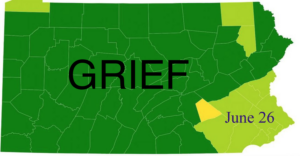
Grief does not change you,
It reveals you!
John Green,
The Fault in Our Stars
It seems that it was just yesterday that we were talking about the importance of “Going Green”. For businesses it meant reducing the overall environmental impact of the organization, and combining those initiatives with energy efficiency measures that conserve the earth’s resources, thus making the organization more efficient and sustainable. For individuals and communities it could be as simple as living a life that is friendly to the natural environment and sustainable for the earth. Last Friday, PA and a number of other mid-Atlantic states went green, but this is a different type of green, one that initiates the first steps of a return to a pre-COVID world. Perhaps the most significant aspect of going green is the reopening of the many businesses that were shut down by this virus. This will afford many the opportunity to return to work, but it is important to remember that this will not be an easy transition; many are grieving, and the question becomes, “How can we help them through the grieving process?”
David Kesler is considered the world’s foremost expert on grieving. Working with Elisabeth Kubler-Ross, he co-authored Grief and Grieving and recently published, Finding Meaning: The Sixth Stage of Grief. In this month’s HBR, Kessler addresses the need for organizations to help their teams heal. He believes leaders must recognize people’s grief, support them in working through it, and assist them in finding meaning in their new life. This crisis has been a shock to all of us and we have all dealt with it differently depending on our circumstances. It is with this in mind, that we must acknowledge that there will be a need for varying types of individual support.
What do we know about grief? It is not solely associated with the loss of life and health. It is composed of five stages; denial, anger, bargaining, sadness and acceptance, and there are a number of strategies to assist individuals in moving through it. We also know that grief is very personal; it is not sequential nor does it happen in predictable timeframes. The key is to be found in identifying the feeling associated with each stage so that you know when you have it and can begin to manage it. As people return to work, their grief will join them. Some will be angry, and need space and our patience. Others, who question the pandemic statistics, may be in denial. Regardless, what is important to remember is that we must not only permit, but encourage others to let these feelings move through them, as this is how you get to the fifth stage; acceptance.
Since the Pandemic began Kesler has worked with a number of companies, and while recognizing that there is no cookie cutter approach, he has identified three groups into which many returning to work may fall;
- The Working Well – Are healthy, have not directly experienced sickness around them, but are concerned. They may be grieving the loss of work projects, opportunities, events, trips, weddings, or vacations In essence they are grieving the loss of the normalcy associated with their previous lives. Likewise this group can also experience “Anticipatory Grief” – an anxiety associated with future loss, be it economic, opportunities, or a loved one. Just being at work helps them.
- The Affected – Were sick themselves or know someone who was sick and recovered, or is recovering. These individuals have experienced trauma. They will need accommodation and validation. Some will need counseling and others will need support mechanisms. All will need the collective empathy of those with whom they work and to whom they report.
- The Bereaved – Have been the most severely impacted. They have lost a loved one, are grieving a death and will be dealing directly with the five stages. For many, at this point in time, acceptance is not even on the horizon. They will also need accommodation, possibly counseling, and empathy.
As we move further into green, organizations will need to recognize that grief in the workplace is not going away. The second COVID spike occurring in many states is witnessing increased case identification and deaths. It’s going to get worse before it gets better. Organizations calling people back to work will have many grieving team members, how will they be treated? Will it be in a manner that turns post traumatic stress into post-traumatic growth? As leaders set forth a new vision, will they ask employees, “How can we make-up for lost time and revenue?” or will they invite them into their offices and ask, “How are you doing today and how can we support you?”
Kesler leaves us with this, “The Pandemic is one season in our lives; it will end. It will be remembered as an extraordinary difficult time. But the slow process of returning to a new normal – of naming our grief, of helping one another reach acceptance, and finding meaning, will continue. For leaders, this moment is an opportunity!”
